Stay in the know on all smart updates of your favorite topics.
Cenex Webinar #2 - EV Chargers: How to know where to place them?

Join us for an exclusive webinar featuring three leading European cities sharing their proven strategies for EV charging infrastructure placement. Learn from real-world experiences and discover data-driven approaches that are transforming urban mobility across Europe.
𝗪𝗵𝗮𝘁 𝗬𝗼𝘂'𝗹𝗹 𝗟𝗲𝗮𝗿𝗻
🏙️ 𝗦𝘁𝗿𝗮𝘁𝗲𝗴𝗶𝗰 𝗣𝗹𝗮𝗰𝗲𝗺𝗲𝗻𝘁 𝗔𝗽𝗽𝗿𝗼𝗮𝗰𝗵𝗲𝘀 - Discover how Brighton & Hove, Oslo, and Metropolitan Region of Amsterdam Electric have developed their EV charging strategies
📊 𝗗𝗮𝘁𝗮-𝗗𝗿𝗶𝘃𝗲𝗻 𝗗𝗲𝗰𝗶𝘀𝗶𝗼𝗻 𝗠𝗮𝗸𝗶𝗻𝗴 - Learn about the tools and methodologies these cities use to optimize charging point locations
🚗 𝗦𝗲𝗿𝘃𝗶𝗻𝗴 𝗔𝗹𝗹 𝗥𝗲𝘀𝗶𝗱𝗲𝗻𝘁𝘀 - Understand how to address the needs of residents without private parking spaces
🌍 𝗜𝗻𝘁𝗲𝗿𝗻𝗮𝘁𝗶𝗼𝗻𝗮𝗹 𝗕𝗲𝘀𝘁 𝗣𝗿𝗮𝗰𝘁𝗶𝗰𝗲𝘀 - Gain insights from three different countries and municipal perspectives
💡 𝗟𝗲𝘀𝘀𝗼𝗻𝘀 𝗟𝗲𝗮𝗿𝗻𝗲𝗱 - Avoid common pitfalls and learn from real implementation experiences
𝗙𝗲𝗮𝘁𝘂𝗿𝗲𝗱 𝗦𝗽𝗲𝗮𝗸𝗲𝗿𝘀
Kieran Fitsall - Brighton & Hove Council
Sture Portvik & Sara Teige Kalsaas - City of Oslo
Annekee de Jager - MRA-e (Amsterdam Metropolitan Region)
Hosted by Sanne van Breukelen - Cenex Nederland
𝗪𝗵𝘆 𝗔𝘁𝘁𝗲𝗻𝗱?
With Europe requiring 6.8 million public charging points by 2030, municipalities face unprecedented challenges in planning and implementing EV infrastructure. This webinar brings together three cities that have successfully navigated these challenges, offering practical insights for:
- Municipal planning departments
- Urban mobility professionals
- EV infrastructure developers
- Policy makers and city officials
- Transport consultants
𝗞𝗲𝘆 𝗧𝗼𝗽𝗶𝗰𝘀 𝗖𝗼𝘃𝗲𝗿𝗲𝗱
- Historical approaches vs. modern data-driven strategies
- Stakeholder engagement
- Grid capacity considerations and smart charging integration
- On-street charging solutions for urban residents
𝗪𝗵𝗼 𝗦𝗵𝗼𝘂𝗹𝗱 𝗔𝘁𝘁𝗲𝗻𝗱
This webinar is essential for anyone involved in:
- Urban planning and development
- Sustainable transport initiatives
- EV infrastructure deployment
- Municipal policy development
- European mobility strategy
𝗥𝗲𝗴𝗶𝘀𝘁𝗿𝗮𝘁𝗶𝗼𝗻
Don't miss this opportunity to learn from Europe's leading cities in EV infrastructure planning. Register now to secure your spot and gain access to exclusive insights that could transform your city's approach to EV charging.
---
This webinar is part of Cenex's ongoing commitment to accelerating the transition to sustainable transport through knowledge sharing and best practice dissemination across European cities.
Cenex Nederland Lenteborrel 2025 - 8 mei

🌿 Vier de lente met ons tijdens de Cenex Nederland Lenteborrel 2025! 🌸
[English below]
Op 8 mei 2025 organiseren we weer een nieuwe editie van de Cenex Lenteborrel! Dit jaar is de editie open voor iedereen, het wordt een inspirerende middag vol innovatie, samenwerking en netwerkmogelijkheden.
📍 Locatie: A-lab, Overhoeksplein 2, 1031 KS Amsterdam
🕒 Tijd: 13:30 - 18:30
✨ Wat kun je verwachten?
🔹 13:30 - 15:30 – Inloop & exposanten
Ontmoet onze exposanten en ontdek de nieuwste innovaties op het gebied van mobiliteit en circulariteit.
🔹 13:30 - 15:00 – Twee serious games
Doe mee aan een interactieve sessie en verken de uitdagingen en kansen in de sector op een speelse manier. Liever toeschouwer? Dat kan ook! (Kies één sessie)
🔹 15:30 - 16:45 – Vijf inspirerende keynotes (Engels)
We verwelkomen sprekers van onder andere:
⚡ Coding the Curbs
⚡ Kempower
⚡ Ministerie van Infrastructuur en Waterstaat
⚡ Circular Campus
⚡ Cenex Nederland
🔹 16:45 - 18:30 – Gezellige Lenteborrel
Sluit de dag af met een hapje en een drankje, terwijl je nieuwe connecties legt met andere professionals.
Houd onze Eventbrite-pagina en LinkedIn in de gaten voor updates over sprekers en exposanten!
📢 Bevestig je aanwezigheid en mis het niet! (Beperkt aantal tickets beschikbaar)
Registreer hier: https://cenex-lenteborrel-2025.eventbrite.nl
-------English
🌿 Join us for the Cenex Spring Reception 2025! 🌸
On May 8, 2025, we’re hosting the latest edition of the Cenex Lenteborrel (Spring Drinks)—and this year, it’s open to all! Expect an inspiring and engaging afternoon filled with innovation, collaboration, and networking.
📍 Location: A-lab, Overhoeksplein 2, 1031 KS Amsterdam
🕒 Time: 13:30 - 18:30
✨ What’s in store?
🔹 13:30 - 15:30 – Walk-in & exhibitor showcase
Meet our exhibitors and explore the latest advancements in mobility and circularity.
🔹 13:30 - 15:00 – Two serious games
Join an interactive session tackling industry challenges in a fun, engaging way. Prefer to observe? That’s possible too! (Choose one session.)
🔹 15:30 - 16:45 – Five inspiring keynotes (English)
Industry leaders will share their insights, including:
⚡ Coding the Curbs
⚡ Kempower
⚡ Ministry of Infrastructure and Water Management
⚡ Circular Campus Delft
⚡ Cenex Netherlands
🔹 16:45 - 18:30 – Spring Networking Reception
Wrap up the day with drinks, bites, and great conversations with fellow professionals.
Stay tuned via our Eventbrite page and LinkedIn for speaker and exhibitor updates!
📢 Confirm your attendance and don’t miss out! (Limited tickets available)
Register here: https://cenex-lenteborrel-2025.eventbrite.nl
Eindconferentie: LIFE Arenapoort project (netcongestie)
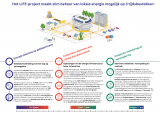
Met het LIFE project in Amsterdam Zuidoost zijn we bezig met een eindconferentie te organiseren op 4 maart middag (13u-17.30) bij de Johan Cruijff Arena en je bent uiteraard van harte welkom (net als je collega's)!
Hieronder de aanmeld pagina met de programma:
[https://www.eventbrite.nl/e/tickets-eindconferentie-life-project-1206732572609](https://www.eventbrite.nl/e/tickets-eindconferentie-life-project-1206732572609 "https://www.eventbrite.nl/e/tickets-eindconferentie-life-project-1206732572609")
Het conferentie gaat over de bijdrage van het LIFE project om innovaties te realiseren om netcongestie te beheren op gebiedsniveau, <strong>in samenwerking met Alliander, Johan Cruijff Arena, Gemeente Amsterdam, TU Delft, Spectral, AMS Institute en andere tech en kennis partners</strong>. Er komen ook inspirerende keynote sprekers om de context te laten zien waarin het project opereert:
- Bart van der Laan, Programmamanager Flexibel Energiegebruik, Alliander
- Ellen Nieuwboer, Projectdirectuer gebiedsontwikkeling, Gemeente Amsterdam
- Roland Lazet (ING) & Andro Bottse (Green Business Club Zuidoost), EnergyHub Arenapoort Taskforce
Samen kijken we naar hoe de onderzoek en tools van LIFE wordt toegepast in Amsterdam Zuidoost om netcongestie op een inclusief en collectief manier te kunnen beheren.
Tot 4 maart bij de Arena!
Project Team LIFE
Artikel 'Eigen opwek voor de buurt - Slim omgaan met het bestaande net'

Hugo Niesing, directeur van Resourcefully, werd geïnterviewd in het decembernummer 2024 van het gemeentelijk magazine van Amsterdam over innovatieve oplossingen voor de integratie van mobiliteit, energie en netcongestie. Het artikel laat zien hoe projecten zoals de pilot in Sporenburg in het Oostelijk Havengebied bijdragen aan een duurzaam en toekomstbestendig lokaal energiesysteem. Hier werken we met 500 huishoudens om piekuren te verminderen en lokaal opgewekte energie optimaal te benutten.
Lees hier meer over dit inspirerende initiatief via de link.
Last spots available for "Prototype for Change" project. Pitching your digital challenge february 4 and receive a prototype of a new website in june 2025 by talented, datadriven students UvA!
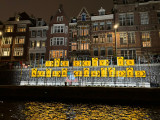
Do you work on innovative new ideas and are in for a project where talented students develop digital prototypes of websites aiming for Change? Do you want work with students from the most innovative datascience programme of the University of Amsterdam? Please reach out to me and drop me an email at: s.a.hansen@uva.nl or call me.
Students Computational Social Science are tasked with designing a website aimed at driving behavioral change in the contexts of climate change, surveillance, renewable energy, Circular economy or health. The project involves iterative prototyping and testing phases, which include conducting focus groups and experiments to refine users’ experience and impact.
The final deliverables include:
- A website (in python)
- A written report, investing divergent stakeholder perspectives and emphasizing effective opportunities for digital interventions
Students will also prepare and deliver a presentation of the study’s major findings to the partner, stakeholders, and their peers.
In 16 weeks from a challenge and idea into a prototype.
The only commitment we ask is your time, for at least 1 hour a week.
Please let us know if you have interesting project ideas!
greetings, Suzanne Hansen, head of partnerships Computational Social Science
M: 06- 482 72 193 | s.a.hansen@uva.nl
--
De opleiding Computational Social Science, is een innovatieve datascience opleiding van de UvA gericht op de publieke sector. Onze internationale en gepassioneerde studenten werken 2x per jaar, in februari en september in teams aan digitale producten zoals websites, data analyses, infographics en meer.
Wat wij zoeken zijn ambitieuze opdrachtgevers en innovators, die 1 uur per week willen investeren en boeiende challenges kunnen aandragen gericht op gedragsverandering en systeemverandering.
Bel gerust als je meer informatie wilt. Mijn nummer is 06- 482 72 193 en mail is s.a.hansen@uva.nl
Onze studenten werken op de Roeterseiland campus in Adam Oost, waar we voor onze partners ook een fijne werkplek kunnen bieden op de momenten dat zij online of fysiek studenten coachen en inspireren.
Netwerkbijeenkomst Positief Energie District in de Tolhuistuin

5 jaar Amsterdam Innovatie Atelier
In Buiksloterham ontwikkelt ATELIER een wijk die meer energie opwekt dan zij verbruikt en worden slimme energietoepassingen in de praktijk gebracht.
Wat komt er allemaal kijken bij het opzetten van een energiegemeenschap, welke mogelijkheden en structuren er nodig zijn voor het actief delen van energie, hoe kunnen batterijen ingezet kunnen worden om netcongestie tegen te gaan, en hoe kan het concept data commons bijdragen aan een duurzame wijkontwikkeling?
In deze bijeenkomst blikken we terug op onze gezamenlijke resultaten en bespreken we de toekomstplannen in samenwerking met het kennisnetwerk Amsterdam InChange.
De dag wordt geopend door de Amsterdamse wethouder Dirk de Jager en georganiseerd door TNO in samenwerking met de Hogeschool van Amsterdam, AMS Institute, Waag Futurelab en gemeente Amsterdam.
Ben jij actief in het veld? Dan ben je van harte welkom en horen we graag jouw reflectie tijdens de kennissessies die zich richten op lokale energiesystemen, energiegemeenschappen, financiering en data delen.
Meld je voor 13 november aan!
Wanneer: 21 november 2024
Waar: Tolhuistuin, IJpromenade 2, Amsterdam
Ga naar de aanmeldpagina voor meer informatie over het programma en de sessies.
Het Amsterdam Innovatie Atelier is onderdeel van het Smart City EU-project ATELIER
Inkijkjes in de energietransitie: feestelijke opening
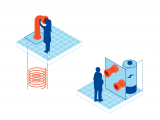
Het valt niet meteen op, maar in Amsterdam Noord is de toekomst al begonnen. De wijk Buiksloterham loopt internationaal voorop in de energietransitie. Gebouwen in de buurt zijn aardgasvrij, en verkrijgen hun energie bijna allemaal op een andere manier. Als voorbijganger of bewoner zie je daar nu weinig van.
Het project ‘Inkijkjes in de Energietransitie’ brengt daar verandering in. Met schilderingen en kunstobjecten op straat geven we virtuele inkijkjes in de apparaten en installaties achter de muren en in kelders. In kijkbuizen met animaties wordt de werking van een warmte-koude-opslag, of het stadswarmtenet, je in een minuut uitgelegd.
De nieuwe technieken mogen gezien worden! Door een wandeling langs de verschillende inkijkjes kom je meer te weten over de verschillende facetten van de energietransitie.
Zo maken we de energietransitie tastbaar, en de discussie erover concreter.
Kom je naar de opening? Op donderdag 13 juni worden de Inkijkjes in de Energietransitie officieel geopend. We presenteren de installaties aan alle betrokkenen: van expert tot bewoner, en aan de buren.
Wanneer: Donderdag 13 juni, 16:00 - 19:00 uur
Waar: Asterdwarsweg 5, Amsterdam Noord
Meld je aan: door te mailen naar floortje [at] waag [punt] org
Het concept ‘Inkijkjes’ komt voort uit de artistieke oproep van Waag Futurelab en een intensief buurtonderzoek (bezoeken, interviews, workshops met buurtbewoners) samen met de geselecteerde ontwerper Tessa Steenkamp en haar design studio Bits of Space.
Miniconferentie Power to the People: Energiedelen in je buurt!
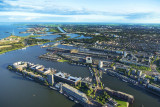
Twee projecten binnen één energiegemeenschap op het Amsterdamse Sporenburgeiland: FlexCity en FlexPower.
FlexPower stuurt de publieke laadpalen aan, FlexCity het verbruik bij mensen thuis. Bewoners wisselen onderling elektriciteit uit via een lokale energiecoöperatie in oprichting.
In het eerste deel praten we met de ‘professionals’, en in het tweede deel met professionals en de échte stakeholders: de buurtbewoners uit Sporenburg. Om 17:00 uur netwerkborrel!
Aanmelden, ga naar: https://resourcefully.nl/#nieuws
Ondanks congestie toch bedrijvigheid op Schiphol Trade Park

Wat in oktober 2020 begon als een urgent probleem – in het gebied waar Schiphol Trade Park in ontwikkeling was was geen extra transportcapaciteit meer mogelijk en de geplande bouw en uitbreiding moest noodgedwongen stoppen – is inmiddels opgelost. Onze baanbrekende virtuele netoplossing is daar nu namelijk ruim twee jaar in werking, en met succes: de bedrijven op Schiphol Trade Park zijn operationeel, breiden uit, en elektrificeren ondanks de netcongestie in het gebied.
Congestie op Schiphol Trade Park
Een blik op de congestiekaart maakt duidelijk dat Schiphol Trade Park in een door congestie grotendeels op slot gezet gebied ligt. Op het middenspanningsnet is geen extra capaciteit beschikbaar voor het transporteren van elektriciteit. Dat betekent dat er niet meer ontwikkeld wordt: een bedrijf krijgt namelijk wel een aansluiting, maar geen transportcapaciteit. Dit is niet alleen een probleem voor de bedrijven die zich hier willen vestigen, maar ook voor gebiedsontwikkelaar SADC (Schiphol Area Development Company), dat in 2020 nog de ambitie had om het meest duurzame business park van Europa te worden (en in 2023 door de BREEAM-NL Outstanding certificering zelfs het meest duurzame logistieke business park van de wereld is!). De ontwikkelaar wilde voorkomen dat bedrijven afzonderlijk een eigen oplossing zochten en er een wildgroei aan gasgeneratoren met de daarbij behorende uitstoot zou ontstaan. SADC zag dat dit slimmer, goedkoper en duurzamer kon, door op een innovatieve manier partijen te verbinden en te laten samenwerken. Bedrijven kunnen daardoor bouwen, uitbreiden en elektrificeren. Over de aanloop naar het project lees je meer op onze projectpagina.
Een doorbraak: de virtuele netoplossing
Alle bij de coöperatie aangesloten bedrijven delen hun eigen transportcapaciteit met elkaar. Zo maken ze slim gebruik van de gereserveerde ruimte. STELLAR Grid Management leest continu de slimme meters uit en stuurt de energiesystemen (zoals zonnepanelen, energie-opslag, en generatoren) achter de meter aan. Bovendien zorgen we voor de financiële afhandeling van deze aansturing, zodat de deelnemende bedrijven elkaar compenseren voor gebruikte elektriciteit en voor het beschikbaar stellen van hun stuurbare energiesystemen.
De resultaten van een jaar virtueel net
Het virtuele net is twee jaar actief. In het eerste jaar sloten zich nog gefaseerd bedrijven aan bij het collectief. De resultaten van dat jaar zijn voorspoedig, maar niet helemaal volledig.
Nu we een tijdje bezig zijn, delen we met vertrouwen onze resultaten. Voor deze resultaten keken we naar 2023. Zo nemen we dus alle seizoenen en bijbehorende energievraag mee in deze analyse.
Het collectief wordt goed benut: in 2023 is 2.104 MWh aan elektriciteitslevering extra mogelijk gemaakt door het delen van de capaciteit binnen het virtuele net. Zonder deze slimme oplossing hadden heel veel stuurbare energiesystemen, zoals batterijen en generatoren, deze elektriciteit moeten leveren. In het collectief nemen in totaal zeven bedrijven deel die weinig of geen netcapaciteit hebben. Dankzij deze slimme oplossing kunnen de bedrijven gebruikmaken van de beschikbare ruimte en opwek van de buren.
Om zeker te zijn van voldoende elektriciteit binnen de gestelde limieten hebben meerdere bedrijven geïnvesteerd in batterijen en gas- en dieselgeneratoren. Het collectief gebruikt die middelen als er een tekort aan capaciteit is. De generatoren dienen vooral als achtervang. Voordat STELLAR deze aanstuurt, bepaalt het systeem of de aangesloten batterijen kunnen voorzien in het verwachte moment van schaarste. Als de batterij niet voldoende is, schakelt STELLAR automatisch een generator in. In heel 2023 is ertwee keer een generator ingezet om binnen de netlimiet te blijven, voor in totaal 2 uur. Toen de generatoren aangingen waren de batterijen nog niet operationeel, anders waren die generatoren waarschijnlijk niet nodig geweest.
Zonder virtueel net hadden deze partijen moeten investeren in elk een eigen generator (en eventuele back-up generator). Die generatoren hadden gezamenlijk tot 31.000 draaiuren gemaakt. Dat is gelukkig voorkomen. Er is hiermee voor 468.000 m3 minder gas verbruikt, en daardoor is er lokaal 842 ton CO2 minder uitgestoten door generatoren.
Het virtuele net is dus een solide oplossing voor congestiegebieden. Dankzij de slimme aansturing zijn zeven bedrijven operationeel die zonder de virtuele netoplossing hadden moeten uitwijken naar een andere locatie in Nederland of daarbuiten,terwijl een aantal van hen al aan het bouwen was. En er is een enorme hoeveel CO2-uitstoot voorkomen.
De toekomst van Grid Management
We zijn trots op ons virtuele net bij Schiphol Trade Park. We horen ook een enorme urgentie in de markt: veel partijen worstelen met netcongestie en zoeken naar een vergelijkbare oplossing. Maar de toekomst van Grid Management is niet hapklaar. Het project bij Schiphol Trade Park is een pilot, en de voorwaarden van een standaard contractvorm voor een dergelijke collectieve oplossing (groeps-transportovereenkomst) zijn nog niet definitief vastgesteld.
Niet alleen bij Schiphol
Schiphol Trade Park is zeker niet de enige plek in Nederland waar sprake is van congestie. Eerder dit jaar lanceerden we onze oplossing bijvoorbeeld ook in het Zwolse Hessenpoort. Heb jij ook last van congestie? We denken graag met je mee. Neem contact met ons op.
⚡️Powering the Future - Discussions on sustainable solutions for our digital dependency

Powering the future
Sustainable solutions for our digital dependency
Cloud computing does not take place in the sky. Gigantic data centers are popping up all around us, home to new AI services and Bitcoin mining operations that consume more energy than the entire country of the Netherlands annually. Code using Python & Java (the most popular) can use up to 45x times as much energy as other programming languages. Whether you are a programmer or user, our dependence on all this processing power is creating a new energy competition between our homes / businesses and our digital lives. What are some examples for sustainable development? Join us April 18th where we talk to industry pioneers that are developing serious solutions to solve our addiction to energy.
AGENDA:
17:00 Welcome drinks - Welcome drinks to break the ice and network a bit with fellow attendees.
17:30 Opening and Welcome - Pinch / Appsterdam
17:35 Kick-off Speaker - Tom Moran - Technology and Sustainability Strategy Consultant. Tom has been working in sustainability for over 30 years and technology for over 20 years. Tom is going to talk about why “the cloud” is not more sustainable, carbon footprints don’t matter, net zero targets are meaningless and why you should be skeptical of the AI hype machine.
Tom will also talk about what IT people who care about the environmental impact of their work need to understand and do to make a difference.
18:15 Food is served
19:00 Luisa García Montoya - Product Manager DX at AMS-IX. Luisa is passionate about leveraging technology to drive meaningful change. Drawing from her experience interacting with a diverse array of ISPs, telecoms, cloud providers, content delivery networks, and other participants involved in the digital ecosystem, Luisa will delve into the urgency for more sustainable code. The rise of ChatGPT/AI has created significant challenges for energy consumption. Recent laws and regulations are beginning to enforce standards to counteract these challenges. What aspects will programming practices need to account for? In her talk, Luisa discusses these challenges and opportunities, sharing some hard realities and examples, such as how mutualized infrastructures and data sharing can help save energy and money while also encouraging creativity in programming.
20:00 Closing and networking drinks.
Underground Challenge: Collaborating, Sharing Data, and Co-Planning
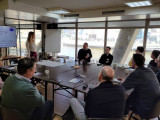
The underground is filled with infrastructure and other assets, including electricity cables, fibre optic cables, gas pipelines, heat networks, sewers, and more. Additionally, underground spaces host natural elements crucial for maintaining a healthy urban environment, such as soil essential for urban trees. Consequently, various stakeholders regularly need access to the underground, each with their own interests, creating significant pressure on the underground. Frequent excavation leads to disruptions, extensive damage, and trees that don’t age past 60 (which is very young for trees).
Improvements can be made by enhancing collaboration among stakeholders, sharing more data, and collectively planning underground activities. Understanding the interests of all involved parties is crucial to developing an action plan aimed at enhancing the quality and management of the underground.
Doe mee aan de Green Innovation Hub contest!

In Almere en de provincie Flevoland vinden de grootste gebiedsontwikkelingen van Nederland plaats zoals Hortus, Pampus, Zuidoever. Om echt toekomstgericht te kunnen bouwen en als voorbeeld te dienen voor de rest van Nederland, organiseren zij de Green Innovation Hub contest ’24. In deze competitie worden organisaties uitgedaagd om met digitaal gedreven toepassingen te komen op het gebied van duurzame energie, mobiliteit of slim wonen.
Ben jij een start-up, scale-up of een innovatief kleinbedrijf (MKB), en heb jij een digitaal gedreven toepassing op het gebied van duurzame energie, mobiliteit of slim wonen? Is jouw oplossing klaar om verder te groeien, te versnellen en op te schalen? Een oplossing waarmee jij echt impact kan maken? Doe dan mee met de Green Innovation Hub Contest ’24.
Op 6 maart wordt op basis van de ingezonden video-pitches een selectie gemaakt van de tien bedrijven die worden uitgenodigd voor het Green Innovation Hub Café. Op woensdag 17 april vindt de Contest Day plaats, tevens de officiële opening van de GIH 3.0 op de 9e verdieping. Tijdens dit evenement zullen de 10 deelnemers hun pitch presenteren, met een maximale duur van 4 minuten. Na de pitches krijgt de jury de gelegenheid om vragen te stellen. De winnaar wordt door experts verder geholpen en begeleid.
Check de website link voor meer informatie!
AMS Scientific Conference: Reinventing the City - Blueprints for messy cities?

Reinventing the City Conference, April 23-25, 2024, Amsterdam. The ticket sale has started! Purchase your ticket and be part of this amazing event!
Join us for the Reinventing the City conference, where we will explore sustainable urban transformations on a metropolitan scale. Scientists, policymakers, students, and industry partners will come together to share insights, inspire action, and shape the future of our cities.
Purchase your ticket here
About the conference
The AMS Scientific Conference (AMS Conference) explores and discusses how cities can transform themselves to become more livable, resilient and sustainable while offering economic stability. Cities are innovation hubs, where an increasing number of people live, work, recreate, interact, and care. The urban fabric is where major transitions take place, catalyzing advancements in mobility, circularity, renewable energy, climate adaptation, urban food systems and digitization. Precisely for these reasons, our cities set the agenda for improving the livability and sustainability of our world.
Cultivating transformation
To foster improved urban environments, we need scientific and societal insights into our complex urban systems, into how natural and social processes are interconnected and reach tipping points, into the good, the bad and the ugly of our cities. We need amazing discoveries, technical and social innovations to transform the ugly, leave the bad behind and reach for the good. And most of all, we need to make the city together, because WE are the city.
Theme of this year
In this second edition of “Reinventing the City”, the overarching theme will be ‘Blueprints for messy cities? Navigating the interplay of order and complexity'. In three captivating days, we will explore ‘The good, the bad, and the ugly’ (day 1), ‘Amazing discoveries’ (day 2) and ‘We are the city’ (day 3).
Day 1: 'The good, the bad, and the ugly'
The first day of the AMS Conference primarily focuses on the messiness: the various aspects of urban development and innovation. "The good" refers to success stories and positive developments in cities. "The bad" relates to challenges and issues that cities face, and "the ugly" pertains to less attractive aspects of urban development. This theme explores how cities, both in terms of space and users, evolve in both positive and negative ways.
Day 2: 'Amazing discoveries'
The second day of the conference concentrates on pioneering research and innovations, both technical and social, in the field of urban renewal and sustainability. Here, we ask participants to present and discuss new and exciting discoveries that have a positive impact on urban areas. We focus on areas such as mobility, food, circularity, energy, climate resilience, and smart data.
Day 3: 'WE are the city'
This theme emphasizes that the people living and working in cities play an essential role in urban renewal and development. This can involve community engagement, citizen participation, public-private partnerships, and the importance of involving all stakeholders in the city. Only together can we create livable and inclusive cities.
Topics
mobility | circularity | energy transition | climate adaptation | urban food systems | digitization | diversity | inclusion | living labs | transdisciplinary research
Registration Options
- Full Conference Access: Immerse yourself in the entire event, spanning three captivating days, each dedicated to a distinct theme:
- Day 1: The Good, the Bad, and the Ugly
- Day 2: Amazing Discoveries
- Day 3: We Are the City
- Single-Day Access: If your schedule is tight, you can opt for a single-day pass to attend the day that interests you the most.
- Student Access: To encourage student participation in our conference, we offer exclusive student rates. Universities often provide funding opportunities to support students in attending conferences like ours. We encourage students to explore the available funds and grants at their respective universities. It's a great way to help offset the costs of your participation. Please note that student passes are available to currently enrolled students with valid student IDs.
Conference Fees
- Full Conference Pass: €650,-
- Single-Day Pass: €150,-
- Student Full Conference pass: €200,-
Finding underground infrastructure without digging
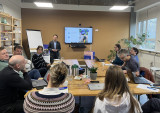
Following the Data Dilemmas event in October, which focused on underground infrastructure, this deep dive session delved further into the question: How can we look under the ground without digging? The session began with an introduction by Alliander, followed by additional insights from Port of Amsterdam, Eurofiber, City of Amsterdam, and Stedin. After exploring the issue, various parties pitched their solutions.
The problem of Alliander
Alliander is anticipating a significant workload in the next 2-10 years, requiring a lot of resources (personnel, materials, and services). We are transitioning away from gas, which means that many gas connections have to be removed. Currently, Alliander is removing around 12,000 connections per year, this is expected to increase to around 100,000 in 2030.
The primary challenge in the removal process is locating the gas line. Due to missing or outdated drawings, ground subsidence, or discrepancies between installation and location, they are often difficult to locate. This leads to time-consuming and costly excavation and often excavation damage.
Alliander employs several search methods to locate the gas lines:
- Probe: This is a probe that can be entered via the main gas valve, with a transmitter so that you can trace it from the outside.
- Gas camera: Attached to the probe to see where the gas connections are.
- Ground penetrating radar (GPR): Sonar scan of the ground.
- Chenny: Similar to probe.
- Frequency on metal tubes: For metal pipes, you can set a frequency on the pipe that can be detected.
- Ultra-sonic: By putting a sound signal on the pipe you can register the vibrating gas molecules with a microphone.
These techniques are not always sufficient and come with many drawbacks. This is why Alliander is seeking a better way for technicians to know where to dig without opening the ground.
Additional Insights
Additional insights from various stakeholders highlight common challenges related to underground infrastructure. The main problem is that the data of the underground is not the same as the real-time situation. This leads to scanning methods being necessary in the first place.
The data which is documented is also lacking because it doesn’t show things such as ground pollution, and the z-coordinate (depth) is also missing. There is potential for improvement since most parties have better databases of their own assets. This data is unfortunately not shared since it is not required by KLIC (Information and Coordination Center for Underground Infrastructure).
Solution Pitches
1. SpectroAG – Hamed Mehdipoor: Combines GPR, electromagnetic wave emission, robots, and drones to scan large ground areas in high resolution. The data is analyzed by an AI Brain Cloud, providing a 3D representation of asset locations. Challenges may arise in areas with clay ground, since this is always a problem with GPR.
2. Inframent – Marina Kurnevich: A startup addressing asset registration issues. Their solution involves taking photos of open trenches with a smartphone or tablet, instantly uploading them to their application, and adding location data. This ensures immediate and accurate registration of underground data.
3. Infratags – Henk Schwietert (Evalan): Their passive (no battery) RFID tags (Infratags) can be attached to cables and connection sleeves, allowing easy identification above ground using a scanner. The low-cost tags, around 50 cents each, can easily help find tagged assets. However, challenges include conflicting interests and delayed returns on investment. The Infratag was developed in collaboration with Tallo.
4. HvA Sensorlab - Marcel van der Horst: While not offering a direct solution, HvA Sensorlab has students capable of working on the problem. They have access to advanced equipment for developing or improving solutions.
5. VLabs – Diemer Cohen Stuart: Uses GIS data and Augmented Reality (AR) to visualize accurate geodata through AR glasses. This simplifies operational work, improves quality control, and allows for on-site guidance with work instructions. The glasses provide 5-10 cm accuracy, with a cost of 8500 euros per pair.
Are you interested in any of these solutions, would you like more information, or do you have an even better solution? Please don’t hesitate to reach out to Noor – noor@amsterdamsmartcity.com, or leave a comment below. We will continue with this topic in 2024!
Vacature: Communicatiemedewerker (10 uur per week)
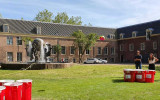
Ben jij student communicatie, hbo of wo? Zoek je een geweldig leuke, flexibele bijbaan als communicatiemedewerker, met veel eigen verantwoordelijkheid in hartje Amsterdam? Solliciteer direct!
Amsterdam Economic Board is op zoek naar een enthousiaste student die per 1 februari 2024 het communicatieteam helpt met mailings, content en events. We werken op een geweldige plek in Amsterdam: het Marineterrein. Je kunt ook vanuit huis werken en je eigen tijd indelen. De 10 uur per week verdeel je, in overleg, over een aantal dagen.
Wie zijn wij?
Amsterdam Economic Board is het netwerk van bedrijven, kennisinstellingen, overheden en maatschappelijke organisaties met wie je samenwerkt aan de slimme, groene en gezonde Metropool van Morgen. Onze grote kracht is ons sterke en relevante netwerk, zoals onze Board, de Network Council, Young on Board en andere partners met wie we bouwen aan coalities. Dat doen we binnen de belangrijke, maatschappelijke thema’s waar Amsterdam Economic Board aan werkt. Samen zetten we initiatieven in gang, als antwoord op complexe uitdagingen.
Wie ben jij?
- Je bent student communicatie (hbo of wo)
- Je vindt het leuk om ervaring op te doen in een dynamisch communicatieteam
- Je bent gemotiveerd om je te verdiepen in de onderwerpen waar we aan werken
- Je bent een aanpakker die makkelijk switcht tussen taken. Je werkt planmatig, bent praktisch en dienstverlenend
- Je durft vragen te stellen en met oplossingen te komen
- Je hebt uitstekende kennis van de Nederlandse en Engelse taal (een schrijfopdracht kan deel uitmaken van de sollicitatieprocedure)
- Ervaring is niet nodig, maar mag natuurlijk wel.
Wat ga je doen als communicatiemedewerker?
- Je publiceert actuele content op onze website (WordPress) en social media-kanalen (LinkedIn en X)
- Je geeft event-uitnodigingen en de nieuwsbrief vorm in Mailchimp en verzorgt eventregistratie in Eventbrite
- Je helpt bij diverse events en bijeenkomsten
- Je maakt presentaties in Powerpoint
Wat bieden wij?
- Een functie per 1 februari 2024 voor 10 uur per week
- Een werkweek die is aangepast aan je studierooster. Je verdeelt je werktijd flexibel over minimaal 3 dagen (binnen kantooruren)
- Een jaarcontract
- Je verdient €17,78 bruto per uur, aangevuld met vakantie- en eindejaartoeslag en diverse vergoedingen.
Interesse gewekt?
Dan horen we graag van je! Stuur uiterlijk 3 januari 2024 je cv en een korte motivatie via solliciteren@amecboard.com. Na de sluitingsdatum maken wij een selectie en hoor je of we je uitnodigen voor een kennismakingsgesprek kort daarna. Een schrijfopdracht kan deel uitmaken van de procedure.
Neem voor meer informatie over de functie contact op met Andrea Joosse via a.joosse@amecboard.com of 06 23 06 38 38. En bekijk vooral onze website. Hopelijk spreken we elkaar snel!
Spectral Receives Investment from ABN AMRO Sustainable Impact Fund to Scale its Operations

Spectral, a pioneer in the integration of energy and information technologies and a highly impactful scale-up in the energy sphere, is excited to announce a major turning point in its expansion. Spectral has successfully secured an investment from ABN AMRO’s Sustainable Impact Fund (SIF). The fund invests in impact-driven companies seeking both social and financial returns. The investment will primarily be used to scale and professionalize operations.
Swedish Chamber Tech for Good by Ericsson at the 5G Hub Eindhoven

The Swedish Chamber of Commerce and Ericsson is very pleased to invite you and your business relations to the exciting Swedish Chamber of Commerce Tech for Good – 5G Impact on Sustainability, which will be hosted by Ericsson on November 7, 2023, at the 5G Hub at High Tech Campus Eindhoven.
The digital transformation is an important enabler for companies to become more sustainable: when business processes become more efficient, companies will be able to save energy and/or reduce CO2 emissions. 5G plays a key role in the digital transformation. This is demonstrated at the 5G-Hub in Eindhoven, a joint initiative of Ericsson, Vodafone-Ziggo, Brainport Eindhoven, and High Tech Campus. The 5G hub was established to promote innovation and stimulate solutions that help improve sustainability.
This event is offered free of charge, registration is however, compulsory.
Sign up at the Swedish Chamber of Commerce website:
November 7, 2023 Tech for Good by Ericsson at the 5G Hub – Swedish Chamber of Commerce
For more information visit our website or send an email to events@swedishchamber.nl
Technologies that allow for looking underground without digging
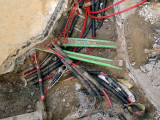
The ground is full of cables, pipes, and other assets but we don’t always know exactly where they are located. Digging is the most common practice to look for assets, however, this has many negative impacts. It can lead to damage to assets, it costs time and money to dig, and it is often an inconvenience to the direct surroundings.
Therefore, it would be extremely convenient if we could find methods to locate assets without having to dig. We are looking for start-ups, research groups, and knowledge institutions that have developed or can develop a technology that can scan, detect, or sense, underground assets without digging.
Are you the person we are looking for, or do you know the person or organisation we are looking for? Please let us know by sending a message to noor@amsterdamsmartcity.com or leaving a comment below.
Smart Energy Community - Elaad Testlab - Arnhem

Op 31 oktober organiseren FAN en TKI Urban Energy de tweede fysieke netwerkbijeenkomst van de Smart Energy Community, in het testlab van ElaadNL, Arnhem, met als onderwerp:
Domotica en Home Energy Management Systems in de praktijk
Eindgebruikers aan het woord
Hoe weerbarstig is de praktijk? Sommige eindgebruikers zijn zelf al aan de slag gegaan met domotica om hun energiegebruik slim aan te sturen. Wij laten drie van deze enthousiastelingen aan het woord: Jan Kerdel, Michiel Damoiseaux & Harm van den Brink. Wat zijn hun ervaringen? Waar liepen ze tegenaan?
Setting the scene: HEMS & Domotica
Jasmijn Kleij van TKI Urban Energy gaat in op de vraag of Domotica ook kansen op voor slim energiemanagement biedt, of dat het nu nog vooral een oplossing voor de enthousiaste knutselaars.
Praktische lessen uit Belgie
Giovanni Oorthuizen van Xemex zal een presentatie geven over de nieuwe wet- en regelgeving in België, hoe zij daarop inspelen met energiediensten, en hun ervaringen met eindgebruikers.
En verder
* Paneldiscussie over Domotica, energiemanagement en de rol van de eindgebruiker
* Speeddaten & netwerken
Aanmelden
https://www.aanmelder.nl/smartenergyday/subscribe
Volledige programma ochtendsessie:
https://www.aanmelder.nl/smartenergyday/wiki/924116/ochtendprogramma
Volledige programma middagsessie: 'Smart Energy Day 2.0', georganiseerd door TKI Urban Energy, Dutch Power, Connectr, RVO en ElaadNL
https://www.aanmelder.nl/smartenergyday/part_program
Demoday #21: How to share the learnings of Local Energy Systems and form a coalition
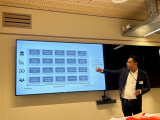
When thinking about the decarbonization of cities, Local Energy Systems (LES) are often mentioned as one of the key enablers in the future. While there is agreement that LES have a role to play in the energy system of the future, what exactly is this role and how do we scale up implementation of this solution?
Cities are a major source of GHG emissions, with UN estimates suggesting that cities are responsible for ~75% of global emissions, mainly by means of transport and energy use in buildings. The decarbonization of buildings within urban areas can prove especially difficult, as space is limited, issues like grid congestion delay further electrification and there are a lot of stakeholders involved.
LES can be a solution in the decarbonisation of buildings in urban areas, like residential spaces, business parks and hybrid areas, creating positive energy districts that simultaneously reduce their impact on the grid. Preliminary LES pilot programs indicate that a LES can support decarbonization by integrating renewable generation and efficiently using energy by decreasing energy losses due to smart grids, communal energy management systems and by combining generation and use as locally as possible. We are however still in the early stages of building and growing LES around the globe, which is why we are focused on getting the right stakeholders together and learning about the requirements for scaling up such systems.
## Case & Set-up of the Session
During the latest Transition Day we hosted a work session on the topic of LES. In the past months, a number of partners in the Amsterdam Smart City network have expressed interest in the topic and would like to work together on the topic. Simultaneously the HvA, who is working on the ATELIER project with the aim to create Positive Energy Districts (PEDs), developed a framework to structurally categorize the various aspects involved in implemeting a LES. During the Demo Day, we considered two topics related to LES The first was a the framework created by the HvA, with the intention of capturing feedback and validating the approach. Secondly, we considered how we can move from an informal network around LES, to a structural coalition that can scale up the concept.
## Insights
A framework for structurally capturing aspects of a LES
Omar Shafqat from the HvA / ATELIer project presented their framework for structurally capturing and monitoring aspects of LES. The framework categorizes various aspects into policy, market, technical and social considerations (from top to bottom). Next to that, it divides these aspects on a timeline along a planning horizon from longer term (planning) to shorter term (management). The framework is shown below in this image.
In response to the framework, the participants shared some the following feedback:
- Testing the framework is necessary to validate and improve it. This implies an inventorization of LES projects and working through a few specific cases to check how the framework can be applied, and how it can benefit project managers/owners.
- The framework should also be presented and validated by other key stakeholders such as Amsterdam’s “Task Force Congestion Management”.
- Participants raised the question of who exactly will use the framework, and how? Is this intended as an instrument to be used primarily by academics, and researchers, or also by practitioners?
Forming a coalition on the advancement of LES
The second part of the work session was moderated by Joost Schouten from Royal Haskoning DHV, who led the discussion on the need for building a coalition around LES. He argued that the further development of LES requires an ecosystem approach, since multiple parties with different interests are involved, but there is no clear ‘owner’ of the problem.
A ‘coalition of the willing’ could help to advance the development of LES. A discussion in breakouts led to the following insights:
- A coalition should be formed by the community itself, but it requires a party that coordinates during the kick-off phase. A discussion emerged around whose role should be to take on the coordination phase. Some participants were of the view that this should be led by a governmental party, others thought this should be organised by a network party like Amsterdam Smart City.
- To effectively build a coalition, the involved parties need to be interdependent. To make sure that it is clear that the parties in a LES are interdependent, the parties need to state their interests in developing a LES, to determine whether there is a common goal.
- Even when these interests are not fully aligned, communication between parties can help bridge gaps. Discussion leads to understanding and empathy.
- An ambassador can be a vital enabler in the beginning of building a coalition, as a clear face and point of contact for such a group.
- There are already many other communities and coalitions working on topics related to LES, including but not limited to 02025, New Amsterdam Climate platform, TET-ORAM, TopSector Energie, among others. A key question is whether a new coalition is necessary, or whether it should be possible to join forces with an existing coalition / initiative.
## Conclusions and next steps
Many work session participants indicated support and interest to further contribute to the development of the LES project. The HvA framework was viewed as a useful tool to capture learnings from LES projects to facilitate scaling up. Additionally, the question of how to facilitate collaboration and coalition forming requires further attention. There are many parties involved in the development of LES, and they don’t always have the same interests. However, this is not an issue that any party can ‘own’ or ‘solve’ on its own. It requires an ecosystem approach, which is something that will need to be further detailed.
For now, we will simultaneously work on further building the coalition and looking for LES projects that can be used to test and further develop the framework. If you would like to know more or get involved in the project, for example by contributing you own LES to be tested by the framework itself, let me know via noor@amsterdamsmartycity.com.
This challenge was introduced in the Amsterdam Smart City network by Lennart Zwols from gemeente Amsterdam and Omar Shafqat (HvA). The session was prepared with and moderated by Joost Schouten from Royal HaskoningDHV. Do you have any questions or input for us? Contact me via noor@amsterdamsmartcity.com or leave a comment below. Would you like to know more about the LES challenge? You can find the overview of the challenge with the reports of all the sessions here.
Stay up to date
Get notified about new updates, opportunities or events that match your interests.


